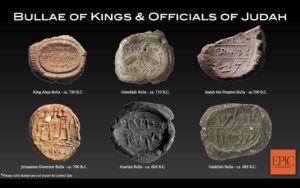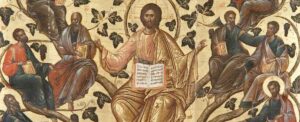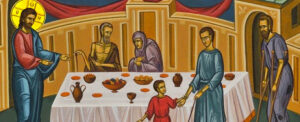by Saint Nicodemos of the Holy Mountain
“Blessed are the pure in heart, for they shall see God” (Matthew 5:8).
“Rejoice evermore. Pray without ceasing. In every thing give thanks: for this is the will of God in Christ Jesus concerning you” (1 Thessalonians 5:16-18).
Let no one think, my fellow Christians, that only the clergy and the monks are obliged to pray unceasingly and at all times, and not also the laity. Oh, no! All of us Christians are obliged to pray always, as well. To demonstrate this, Philotheos, that most-holy Patriarch of Constantinople, writes the following, in his biography of St. Gregory Palamas, Archbishop of Thessalonica:
The divine Gregory had a beloved friend named Job, a very simple man of great virtue. Once when they were conversing, Gregory told him about prayer, that each Christian individually ought always to make an effort to pray, and to pray unceasingly, as the Apostle Paul exhorts all Christians in common, “Pray without ceasing” (1 Thessalonians 5:17), and as the Prophet David says, even though he was king and had all those cares of ruling his kingdom, “I behold the Lord before me always” (Psalm 15:8 LXX) – that is, noetically, by means of prayer, I see the Lord in front of me all the time. And Gregory the Theologian teaches all Christians that we should remember the name of God in prayer more often than we breathe. Having said all this and more to his friend Job, the saint added that we ought to obey the injunctions of the saints, and that we ourselves should not only always pray, but we should instruct also everyone else to do the same: monks and lay people, educated or not, men, women, and children; and should encourage them to pray unceasingly.
When the elder Job heard this, it seemed to him that it was an innovation, and he began to argue, and to say to Gregory that to pray always was only for the ascetics and the monks living away from the world and its distractions, and not for lay people who have jobs and so many cares. The saint responded with more examples and irrefutable proof, but the elder Job was not convinced. So, wishing to avoid talkativeness and argument, Gregory held his tongue, and each went to his cell.
Later, as Job was alone praying in his cell, an angel appeared before him, sent from God Who desires the salvation of all men. The angel sternly rebuked him for arguing with Gregory, and for opposing what was obvious, and that clearly affects the salvation of Christians. He admonished him on behalf of God to be careful from now on, and to beware never again to say something against such a soul-edifying work, for in so doing he would be opposing the will of God. Not even mentally should he ever again dare to harbor any thought contrary to this, or think otherwise than the divine Gregory had told him. Then that most simple elder went at once to Gregory and, falling at his feet, begged forgiveness for contradicting and arguing; and he revealed to him all that the angel of the Lord had said to him.
Do you see, my brethren, how all Christians, small and great, should always pray, using the noetic prayer, “Lord, Jesus Christ, Son of God, have mercy on me”; and how their mind and heart should become accustomed to saying it always? Just think how pleasing this is to God, and how much good comes from it, that out of His extreme love for mankind He even sent a heavenly angel to reveal it to us, so that we should no longer have any doubt about it.
But what do lay people say? “We are involved in so many matters and cares of the world. How can we possibly pray without ceasing?” My answer to them is that God has not commanded us to do anything impossible; but he has commanded us to do all those things that we are able to do. Therefore this too can be accomplished by anyone who diligently seeks the salvation of his soul. For if it were impossible, it would be so for all lay people, and there would never have been so many in the world who did accomplish it. As an example of someone like this, let us take Saint Gregory’s father, that amazing Constantine Palamas.
This man was an official of the imperial court, and was called the father and teacher of the Emperor Andronikos. He was daily occupied with imperial affairs, in addition to those his own house, since he was very wealthy and owned a large estate and servants, and had a wife and children. Nevertheless, he was so inseparable from God and so given to unceasing noetic prayer, that sometimes he would forget what the Emperor and the officials of the palace were discussing with him about imperial matters, and he would ask about the same things several times. Often the other officials, not knowing the reason for this, would become agitated and reproach him for forgetting so quickly, and for disturbing the Emperor with his repeated questions. But the Emperor, who knew the cause, would defend him, saying, “Lucky Constantine has his own concerns, and they do not permit him to pay attention to what we are saying on matters temporal and vain. But the nous of this blessed man is fixed on what is true and heavenly, and thus he forgets what is mundane. All of his attention is focused on the prayer and on God.”
Thus, as the most holy Patriarch Philotheos relates, Constantine was admired and loved by the Emperor and all the magnates and officials of the Empire. Likewise, he was loved by God, and this venerable one was even counted worthy to perform miracles. The holy Philotheos tells us in his biography of Saint Gregory, Constantine’s son, that he took his whole family once on a boat to a place above Galatas, to pay a visit to a hermit who lived in stillness there, and get his blessing. On the way, Constantine asked his servants if they had any food to take to that Abba, so that they might eat with him. The servants said that in the rush they had forgotten to bring any. The blessed man was saddened a bit, but said nothing. As they continued on in the boat, he simply put his hand into the sea, and with silent and noetic prayer he asked God, the Master of the sea, to let him catch something. After a short, he brought up his hand from the sea holding a large bass. Tossing it into the boat in front of his servants, he said, “Look here how our Lord provided for his servant the Abba and has sent him something to eat.”
Do you see, my brethren, with what sort of glory Jesus Christ glorifies those servants who are always with Him and who constantly invoke His sweetest name?
Then there was that righteous and holy Evdokimos. Wasn’t he also in Constantinople, and in the imperial court and involved in state affairs? Didn’t he keep company with the Emperor and the palace officials, with so many cares and distractions? And for all that, noetic prayer was always inseparable from him, as related in his biography by Saint Symeon the Translator. Thus, even though this thrice-blessed man dwelt in the world among worldly things, he nevertheless lived an angelic life above the world. And God, who gives the rewards, counted him worthy to have a blessed and divine end. There were also many, countless others who were in the world and yet were given entirely to this noetic and saving prayer, as we read in the histories.
So, my dear fellow Christians, I beg you, as did once the divine Chrysostom, for the sake of the salvation of your souls, do not neglect this important work of prayer. Imitate those whom we mentioned, and follow their example as far as possible. And though it seem difficult in the beginning, be certain and assured, as if from the person of God Almighty, that this very name of our Lord, Jesus Christ, when we invoke it constantly every day, will make all the difficulties easier. And in the course of time, once we are accustomed to it and it is sweet to say, then we will know from experience that it is not impossible nor difficult, but possible and easy.
That is why the divine Apostle Paul, knowing better than we do the great benefit of prayer, commanded us to pray unceasingly. He would never have advised us to do something too difficult or impossible; for if we were incapable, it follows that we would necessarily appear to be disobedient and transgressors of his commandment, and thus we would be condemned. But what the Apostle meant in saying, “Pray without ceasing,” was that we should pray with our nous, which we can always do. For whether we are working with our hands, or walking, or sitting, or eating and drinking, we can always pray with our mind and do noetic prayer that is pleasing to God and true. We can work with our body and pray with our soul. The outer man performs all bodily functions, and the inner man is entirely devoted to the worship of God, and never ceases from this spiritual work of noetic prayer.
Our divine-human Lord Jesus Himself so commands us in the holy Gospel, saying, “But when you pray, go into your room and shut the door and pray to your Father who is in secret” (Matthew 6:6). The room of the soul is the body; the doors are our five senses. The soul enters its room when the mind does not wander to and fro among worldly things, but remains within our heart. And our senses close and remain closed when we do not allow them to cling to outward sensible things. In this way our mind remains free from every worldly attachment; and through secret noetic prayer, you are united with God your Father. And then, as He says, “your Father Who sees you in secret will reward you openly.” God, Who knows what is secret, sees your noetic prayer and rewards it with great and manifest gifts; for this prayer is true and perfect prayer, and it fills the soul with divine grace and spiritual gifts. It is like perfume: the tighter you stop the vessel, the more fragrant the vessel becomes. So too with prayer: the more you confine it within your heart, the more it fills you with divine grace.
Blessed and fortunate are they who accustom themselves to this heavenly work, for they overcome every temptation of the wicked demons by it, as David prevailed over the proud Goliath. By this work they put out the inordinate desires of the flesh, as the three youths put out the flame of the furnace. By this noetic work of prayer, they calm the passions, as Daniel tamed the wild lions; by it they bring down into their hearts the dew of the Holy Spirit, as Elijah brought down the rain on Mount Carmel. It is this noetic prayer that rises to the throne of God and is kept in the golden bowls, so that the Lord can be censed with it, as John the Theologian says in Revelation, “and the twenty-four elders fell down before the Lamb, each holding a harp, and with golden bowls full of incense, which are the prayers of the saints” (Revelation 5:8). This noetic prayer is a light that ever illumines a man’s soul and ignites his heart with the flames of the love of God. It is a chain that keeps God united with a man and joined together.
O incomparable grace of noetic prayer! This is what makes a man always talk with God. O truly marvelous and extraordinary phenomenon! You are physically with other people and noetically with God. Angels have no audible voice, but noetically they offer unceasing adoration to God. In this consists all their activity and to this their whole life is consecrated. So too you, brother, when you enter your room and shut the door, i.e., when your mind does not scatter here and there but enters into your heart, and your senses are shut and not attached to the things of this world, and you always pray like this with your nous, then you become like the holy angels. And your Father, who sees the secret prayer that you offer him in the depths of your heart, will openly give you great spiritual gifts in return. What could you want that is more or greater than this – when, as I said, you are noetically always with God and constantly talking with him; the One without whom none can ever be happy, neither here nor in the next life?
And finally, brother, whoever you may be, when you get hold of this and read it, I fervently entreat you also, remember to pray to God and say a “Lord have mercy” for the sinful soul of the man who labored over this writing, and the one who paid for it to be published, for they are in great need of prayer, so that they may obtain God’s mercy on their souls, and you on yours. Amen. Amen.
From “The Life of Saint Gregory Palamas, Archbishop of Thessalonica, the Wonderworker” by Saint Nicodemos of the Holy Mountain





